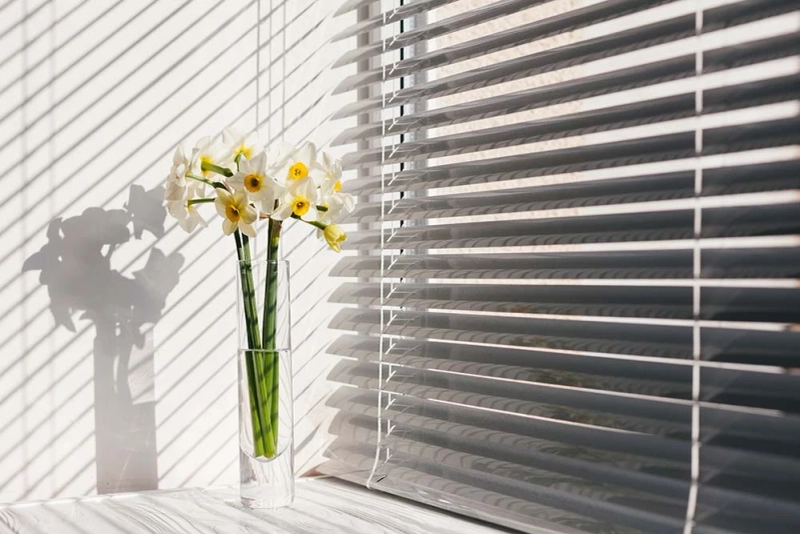When it comes to choosing the perfect window treatment, Venetian blinds have long been a popular option for homeowners and interior designers alike. Their sleek design, versatility, and ease of use make them an attractive choice for a variety of spaces. However, like any window covering, Venetian blinds come with their own set of pros and cons. In this article, we’ll explore both sides of the coin, helping you make an informed decision for your home or office.
The Pros of Venetian Blinds
- Excellent Light Control
One of the standout features of Venetian blinds is their ability to offer precise control over the amount of natural light entering a room. With adjustable slats, you can tilt the blinds to let in just the right amount of light, whether you're looking to brighten up your space or reduce glare. This level of flexibility is particularly useful in rooms like living areas, kitchens, and offices, where the amount of light needed varies throughout the day.
- Privacy Enhancement
Venetian blinds provide a high level of privacy while still allowing for some light. By adjusting the slats to a specific angle, you can ensure that prying eyes from outside can’t see in, while still benefiting from natural light. This makes Venetian blinds an ideal choice for windows facing the street or for bedrooms and bathrooms where privacy is key.
- Variety of Materials
Venetian blinds come in a wide range of materials, including wood, aluminum, PVC, and faux wood. This variety allows homeowners to select blinds that complement their decor and suit their practical needs. For instance, aluminum Venetian blinds are lightweight and durable, making them a great option for kitchens and bathrooms, while wooden Venetian blinds provide a warm, natural aesthetic that works well in living rooms and bedrooms.
- Durability
When properly maintained, Venetian blinds are incredibly durable. They are designed to withstand daily use and can last for years without showing signs of wear and tear. Wooden blinds, in particular, offer a timeless, classic look that adds value to your home, while aluminum and PVC options are resistant to moisture and can be easily cleaned.
- Easy to Maintain
Unlike other window treatments like drapes or curtains, Venetian blinds are relatively low-maintenance. Dusting and wiping down the slats with a microfiber cloth is usually sufficient to keep them looking their best. For a deeper clean, you can easily remove and wash the slats (especially if they are made of PVC or aluminum).
- Customizable Fit
Venetian blinds can be adjusted to fit a wide variety of window sizes. Whether you have large picture windows or small, narrow spaces, these blinds can be customized to your needs. The Curtain Lab offers a wide selection of Venetian blinds that can be tailored to perfectly suit the dimensions and design of your windows.
The Cons of Venetian Blinds
- Complex Installation Process
While Venetian blinds are easy to operate, their installation can be a bit tricky for some homeowners. Installing the blinds requires precise measurements and proper fitting, especially when it comes to the hardware and brackets. If you’re unsure about the installation process, it’s always a good idea to hire a professional installer. The Curtain Lab offers expert Venetian blinds installation services to ensure a seamless fit and proper functionality.
- Cleaning Can Be Time-Consuming
Although Venetian blinds are relatively easy to clean, the slats can accumulate dust and dirt over time. Cleaning each individual slat can be a time-consuming task, especially if you have large windows or blinds with many slats. Regular maintenance is key, but keep in mind that deep cleaning can take some effort.
- Potential for Damage
Venetian blinds are prone to damage if not handled with care. Wooden blinds can warp or crack due to exposure to moisture, while aluminum blinds may bend or dent if excessive force is applied. Additionally, the cords and mechanisms can wear out over time, requiring repairs or replacements.
- Less Insulation
While Venetian blinds offer great control over light, they don’t provide the same level of insulation as other window treatments like honeycomb blinds or heavy curtains. In colder months, they may not be as effective at keeping heat in or blocking cold drafts, potentially affecting the energy efficiency of your home.
- Not Ideal for Very Large Windows
While Venetian blinds can be customized to fit many window sizes, they may not be the best choice for very large windows or sliding doors. Blinds for these types of windows can become heavy and difficult to operate. In such cases, alternative treatments like vertical blinds or shades may be more practical.
How to Shorten Venetian Blinds: A Simple DIY Solution
If you find that your Venetian blinds are too long for your windows, the good news is that shortening them is a simple DIY task. Follow the step-by-step guide from our blog, "How to Shorten Venetian Blinds," to trim your blinds to the perfect length. With the right tools and a little patience, you can easily adjust your blinds to fit your windows and maintain their sleek appearance.
Conclusion
Venetian blinds offer numerous benefits, including excellent light control, privacy, and durability. However, they also have their drawbacks, such as a complex installation process and potential maintenance challenges. By weighing these pros and cons, you can make an informed decision about whether Venetian blinds are the right window treatment for your home or office.
If you’re in Sydney, The Curtain Lab provides a wide range of high-quality Venetian blinds that can be tailored to suit your needs, along with expert installation services to ensure the perfect fit for your windows.
Whether you’re adjusting the length of your blinds or choosing a new set, The Curtain Lab is your go-to destination for stylish, functional Venetian blinds that will enhance the look and feel of your home.


